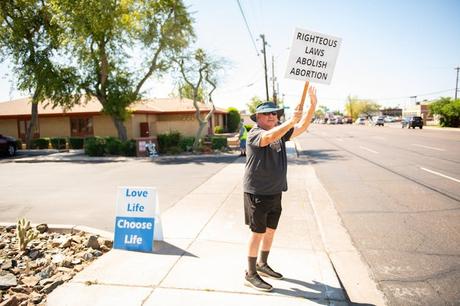 Pro-abortion rights demonstrators rally in Scottsdale, Ariz., on April 15, 2024. Frederic J. Brown/AFP via Getty Images
Pro-abortion rights demonstrators rally in Scottsdale, Ariz., on April 15, 2024. Frederic J. Brown/AFP via Getty Images
When the Supreme Court overturned the constitutional right to get an abortion in June 2022, Justice Clarence Thomas suggested that the court "should reconsider" other rights it currently recognizes - like the rights for same-sex couples to have sex and marry.
If the Supreme Court overturns legal precedents on these and other issues, old state laws that haven't been enforced, possibly for centuries, can suddenly spring back to life.
This is what happened after the Arizona Supreme Court ruled on April 9, 2024, that an 1864 abortion ban should be enforced. The ban is an example of zombie laws - old state laws that are neither enforced nor repealed.
I am a scholar of constitutional rights, particularly rights won in court like student speech, the right to direct one's own medical care, abortion and parental rights.
There are many old and unenforceable state laws that are left on the books because of inertia. It might seem unnecessary for a state legislature to repeal a law that is not enforced or has been superseded by a more recent law.
But the recent Arizona abortion ban shows the consequences of assuming that old laws will always remain dormant.

Arizona's abortion laws
Under Arizona's 1864 abortion law, anyone who helps perform an abortion could be sent to jail for up to five years, unless the abortion was necessary to save the life of the pregnant person.
The law was originally passed by a territorial legislature, then was rubber-stamped into official state law in 1913 by the new state Legislature after Arizona became a U.S. state in 1912. Planned Parenthood challenged this law as unconstitutional in the early 1970s. But that case was still making its way through Arizona courts when the Supreme Court ruled on Roe v. Wade in 1973, affirming the federal right to get an abortion.
In March 1973, an Arizona appeals court issued a short decision that said the Roe decision meant that the Arizona ban was also unconstitutional and could not be enforced.
The Arizona Legislature never formally repealed the law.
In addition, the state went on to enact a number of other restrictions on abortion over the years, including a law that banned abortion after the 15th week of pregnancy. That law went into effect in March 2022, three months before the Supreme Court overturned the Roe decision with its Dobbs v. Jackson Women's Health Organization ruling. The 2022 law was virtually identical to the Mississippi statute being challenged in Dobbs, so its constitutionality was questionable when it was passed, but the Dobbs decision changed that.
This meant Arizona had two laws restricting abortion in different ways at the same time, the 1864 law and the 2022 law. The question for Arizona courts then became which law should go into effect. Four of the state supreme court's seven justices determined on April 9 that the 1864 abortion ban took precedence over the 2022 law that banned abortion only after 15 weeks of pregnancy.
Arizona is not the only state that has conflicting old and new laws about the same issue.
Uncommon, but not unique
Wisconsin, for example, has a very similar dispute playing out in its courts.
Wisconsin has a law from 1849 that bans abortion unless it is necessary to save the life of the mother. This law only banned abortion after what used to be called quickening, meaning when a pregnant person feels fetal movement. This usually happens somewhere between the 16th to 24th week of pregnancy.
In 1858, the law was amended to ban all abortions - and imposed a harsher punishment if the abortion occurred after quickening. That law had some minor tweaks in the 1950s and stayed in effect until Roe v. Wade.
In 2015, however, Wisconsin passed a law banning abortion after 20 weeks of pregnancy. This later law did not replace, repeal or even acknowledge the 1849 law.
Instead, the 2015 law seemed to assume the 1849 law would remain unenforceable and did not challenge Roe v. Wade.
After the Dobbs decision came out, Wisconsin Attorney General Josh Kaul filed a lawsuit against Wisconsin district attorneys arguing that the 20-week ban should replace the 1849 law.
In December 2023, a Wisconsin judge agreed with the attorney general. The case has been appealed to the state Supreme Court, but the court has not yet said if it will hear the appeal.
Other kinds of zombie laws
Other outdated laws stay on the books long after they are actually enforced.
The U.S. Supreme Court can determine that a particular state law is unconstitutional, but it doesn't actually repeal or erase the law in question. The court also cannot remove identical laws passed in other states.
Although the Supreme Court's Obergefell v. Hodges ruling in 2015 gave same-sex couples the constitutional right to get married, for example, 32 states still have old laws prohibiting same-sex marriage. These laws would come back to life if the Supreme Court overturned Obergefell.
It has also been unconstitutional for states to criminalize same-sex sexual activity since the Supreme Court ruled in Lawrence v. Texas in 2003. Still, 12 states have laws that prohibit same-sex sexual relations. Those states could start prosecuting people for this activity if the Supreme Court reversed Lawrence.
This might seem unlikely, but sheriff's deputies in Louisiana arrested men for "violating" the state's unenforceable ban in 2015.
Alabama is another state that has been particularly slow to delete zombie laws. In 2000, it became the last state in the country to remove a statute banning interracial marriage, 33 years after the Supreme Court held in the Loving v. Virginia case that such laws were unconstitutional.
The Alabama state constitution also had provisions from 1901 prohibiting interracial marriage and requiring racial segregation in schools until the language was finally removed in 2022.
These zombie laws are repealed the same way that any other law is passed. The state legislature can pass a law deleting or replacing an older law with new language. Depending on the state, a popular referendum can also change state law and state constitutions.

Lessons from Arizona
As a result of the Arizona court's ruling, both law and politics in the state have been thrown into disarray.
Due to an earlier order about how and when the 1864 law could go into effect, the law cannot be enforced for at least 45 days, and that delay may lengthen if different groups keep fighting about the case in court.
Arizona Governor Katie Hobbs has said that her office will not enforce the ban, and an executive order bars local prosecutors from charging people for violating it.
Both Republican and Democratic politicians in Arizona have said that they want to pass a new law restricting abortion in less severe ways than the 1864 law, but attempts to do so have resulted in angry disagreements on the floor of the Legislature.
The confusion and controversy in Arizona shows the broader problems of zombie laws. Most people in Arizona were surprised that the law exists. Many people on either side of the political spectrum do not like it, but the zombie has come alive in the aftermath of the state Supreme Court's ruling. And each blockbuster Supreme Court decision runs the risk of setting more free in other states.

Dara E. Purvis, Professor of Law,
This article is republished from The Conversation under a Creative Commons license. Read the original article.

